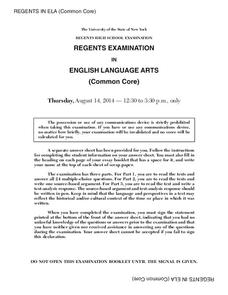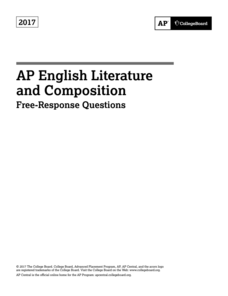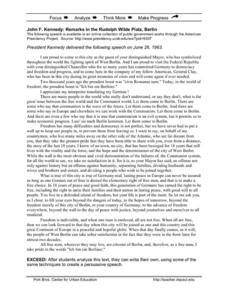Maryland Department of Education
The Concept of Diversity in World Literature Lesson 9: Debating Imperialism
To gain an understanding of Imperialism, class members read Rudyard Kipling's poem, "The White Man's Burden" and Mark Twain's essay, "To the Person Sitting in Darkness." Groups compare these perceptions of non-white cultures with the...
DocsTeach
Analyzing Jackie Robinson's White House Letter
Jackie Robinson: A hero on and off the field. An eye-opening activity focuses on Jackie Robinson's social activism during and after the civil rights movement. Academics read a letter addressed to President Nixon, answer questions, and...
Newseum
From the Front Page to the History Books
Young journalists compare news coverage of four major events with how the same events are covered in historical accounts. The ensuing discussion asks class members to compare and contrast the role of a reporter and the role of a historian.
Benjamin Franklin Tercentenary
The Autobiography of Benjamin Franklin
Need a model for character education? Benjamin Franklin presents himself as in a constant state of striving to become the man he hoped to be, making his autobiography is far more accessible to learners than those of people who consider...
Benjamin Franklin Tercentenary
The Junto Meets Again
Out of the classroom and into the streets! With Ben Franklin’s Junto society as inspiration, learners develop their ideas for improving their communities and put them into action. After analyzing meeting notes to discover what the Junto...
Project Tahoe
Does the Use of Torture on Enemy Combatants Violate the 8th Amendment?
Tackle ethics in your high school history classes with a Socratic seminar about torture as a means for obtaining information. The plan allows for pupils to take the reins during the seminar. On the first day, class members read several...
Curated OER
Seven Habits of Highly Effective Teens Worksheet
Based on the bestselling series, this worksheet details seven habits of highly defective teens, and prompts young learners to consider their own social and emotional tendencies. What kinds of experiences do your pupils have with being...
K12 Reader
Slavery in the Constitution
Your young historians will read excerpts from three parts of the United States Constitution—Article One, the Thirteenth Amendment, and the Fourteenth Amendment—and discuss how they each address the issue of slavery.
Roy Rosenzweig Center for History and New Media
End of the Cold War
How significant was the Cold War during the 20th century? After reading and analyzing speeches by Ronald Reagan and Mikhail Gorbachev, learners consider the historical context of foreign policy decisions made during the Cold War by both...
National Endowment for the Humanities
A Journalist’s Report: The Better Vision for Black Americans
After reading a series of primary source documents detailing the teachings of Martin Luther King, Jr. and Malcolm X, class members craft newspaper columns assessing the strengths and weaknesses of each man's vision, and present their...
Turabian Teacher Collaborative
Parts of Argument II: Article Critique
Break down the parts of argumentative writing with a critical thinking activity. High schoolers read an article of your (or their choice), and use a graphic organizer to delineate the ways the author structures his or her arguments.
PBS
The Sixties: Notes from the Ho Chi Minh Trail
Young historians research the rationales for fighting the Vietnam War, and the controversies surrounding it. They watch film clips, examine photographs, and read Lyndon B. Johnson's message to Congress to gather information for a...
PBS
March on Washington: A Time for Change
Young historians conclude their study of the events that lead up to and the planning for the March on Washington. After examining videos and primary source documents, they consider the civil rights objectives that still need to be...
iCivics
Lesson 1: Journalism
Extra! Extra! Do your pupils know what it takes to be a good journalist? Young news hounds explore the world of journalism through a series of activities that focus on ethical reporting. Learners read, evaluate, and investigate popular...
New York State Education Department
English Language Arts Examination: August 2014
Tired of searching for complex passages suitable for high school level assessments? A challenging examination includes numerous complex text excerpts as well as question items to match them. Learners analyze literary elements, author's...
Alberta Learning
Creating Persuasive and Effective Visuals
Advertisers know how to use persuasive techniques to create powerful visuals that inform and influence others. Class members examine these techniques and then demonstrate their knowledge as they craft posters, flyers, collages, etc. for...
College Board
2002 AP® English Language and Composition Free-Response Questions
It is not what you say but how you say it. Scholars use an essay prompt from the 2002 AP® English Language and Composition Free-Response Questions to analyze how an author uses language to describe her past. They also support or argue a...
College Board
2017 AP® English Literature and Composition Free-Response Questions
Music brings back a memory. One prompt from the 2017 AP® English Literature and Composition Free-Response Questions asks scholars to read a poem and write essays analyzing the relationship between music and the author's memories. Two...
Literacy Design Collaborative
Rhetorical Analysis for Pre-AP English
Scholars closely analyze the use of rhetorical strategies in several model texts. They work in groups to annotate the text identifying rhetorical elements, and to complete a Rhetorical Analysis chart and guided reading worksheet....
US Department of Commerce
The Census Questionnaire: Then and Now
As the United States has changed, so has the census! While required by the Constitution, the questions the government asks to allot representation and federal funding has developed over time. Using images of previous censuses, young...
PBS
Taking A Field Trip
Field trips require a great deal of advanced planning to be successful. Ensure the success of your trips with a step-by-step preparation guide that itemizes before, during, and after activities as well as extension and adaptation...
Texas Education Agency (TEA)
Distinguishing Between Inductive and Deductive Reasoning (English III Reading)
Is Sherlock Holmes an inductivist or a deductivist? Users of this interactive to distinguish between inductive and deductive reasoning. They consider in various situations whether it is better to list evidence and then introduce a claim...
Texas Education Agency (TEA)
Drawing Conclusions Based on the Sufficiency and Strength of Research (English III Reading)
High school juniors learn how to construct a strong argument by crafting a claim and using neutral language backed by evidence from reliable sources. To do so, they learn to evaluate sources and evidence to support claims. They then...
Polk Bros Foundation
John F. Kennedy: Remarks in the Rudolph Wilde Platz, Berlin
“Ich bin ein Berliner.” Here’s the full text of John F. Kennedy’s famous address delivered to the people of Berlin on June 26, 1963. The resource could be used as part of a study of Kennedy’s presidency, of rhetorical devices, or as...
Other popular searches
- Historical Documents
- Oral History Documents
- Literature Circles Documents
- Teaching With Documents
- Founding Documents
- Word Processing Documents
- Html Documents
- Multimedia Documents
- Using Historical Documents
- Technical Documents
- Notable Historical Documents
- Workplace Documents

























